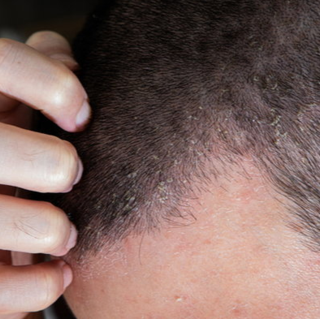 Seborrheic dermatitis is a very common skin condition which presents with itchy, red patches of skin, greasy scales, and flaking. Common areas of involvement include the scalp, ears, eyebrow region, and sides of the nose. It typically occurs in infants younger than 3 months of age and in adults ages 30-60. In infants, the condition is commonly referred to as “cradle cap.” When occurring on the scalp in adolescents and adults, seborrheic dermatitis is often called “dandruff.” The exact cause of the condition is unknown, but Malassezia (a yeast commonly found on our skin), excess oil production, or an immune mediated response may be contributing factors. Though the condition is chronic, treatment options are available including dandruff shampoos and topical medications.
Seborrheic dermatitis is a very common skin condition which presents with itchy, red patches of skin, greasy scales, and flaking. Common areas of involvement include the scalp, ears, eyebrow region, and sides of the nose. It typically occurs in infants younger than 3 months of age and in adults ages 30-60. In infants, the condition is commonly referred to as “cradle cap.” When occurring on the scalp in adolescents and adults, seborrheic dermatitis is often called “dandruff.” The exact cause of the condition is unknown, but Malassezia (a yeast commonly found on our skin), excess oil production, or an immune mediated response may be contributing factors. Though the condition is chronic, treatment options are available including dandruff shampoos and topical medications.
Disclaimer:
The information on this website is provided for educational and information purposes only and is not medical advice. Always consult with a licensed medical provider and follow their recommendations regardless of what you read on this website. If you think you are having a medical emergency, dial 911 or go to the nearest emergency room. Links to other third-party websites are provided for your convenience only. If you decide to access any of the third-party websites, you do so entirely at your own risk and subject to the terms of use for those websites. Neither David Fivenson, MD, Dermatology, PLLC, nor any contributor to this website, makes any representation, express or implied, regarding the information provided on this website or any information you may access on a third-party website using a link. Use of this website does not establish a doctor-patient relationship. If you would like to request an appointment with a health care provider, please call our office at (734) 222-9630 or click here.








